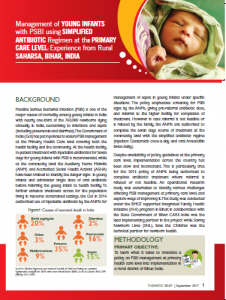
Possible Serious Bacterial Infection (PSBI) is one of the major causes of mortality among young infants in India with nearly one-third of the 760,000 newborns dying annually in India, succumbing to infections and sepsis (including pneumonia and diarrhea).
The Government of India (GoI) has put in policies to ensure PSBI management at the Primary Health Care level covering both the health facility and the community. At the health facility, in-patient treatment with injectable antibiotics for Seven days for young infants with PSBI is recommended, while at the community level the Auxiliary Nurse Midwife (ANM) and Accredited Social Health Activist (ASHA) have been trained to identify the danger signs in young infants and administer single dose of oral antibiotic before referring the young infant to health facility.
To further enhance treatment access for the population living in resource constrained settings, the GoI in 2014 authorized use of injectable antibiotic by the ANMs for management of sepsis in young infants under specific situations. The policy emphasizes screening for PSBI signs by the ANMs, giving pre-referral antibiotic dose, and referral to the higher facility for completion of treatment. However in case referral is not feasible or is refused by the family, the ANMs are authorized to complete the seven days course of treatment at the community level with the simplified antibiotic regime (injection Gentamicin once-a-day and oral Amoxicillin
twice-daily).
Despite availability of policy guidelines at the primary care level, implementation across the country has been slow and inconsistent. This is particularly true for the 2014 policy of ANMs being authorized to complete antibiotic treatment where referral is refused or not feasible. An operational research study was undertaken to identify various challenges affecting PSBI management at primary care level, and explore ways of improving it.
This study was conducted under the BMGF supported Integrated Family Health Initiative (IFHI) program in Bihar, in collaboration with the State Government of Bihar. CA RE-India was the lead implementing partner in the project while Saving Newborn Lives (SNL), Save the Children was the technical partner for newborn health.